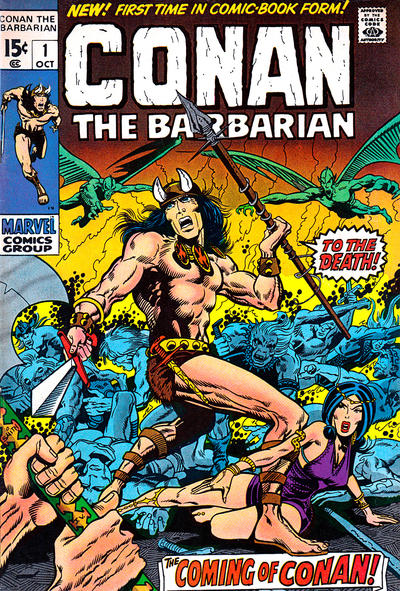|
|
Post by Jason Aiken on Sept 20, 2020 9:58:17 GMT -5
I re-read the story yesterday and have repaired my sins of omission. I was struck by this passage which nicely encapsulates Howard's Wheel of Time: "Time strides onward," said Tuzun Thune calmly. "We live today; what care we for tomorrow—or yesterday? The Wheel turns and nations rise and fall; the world changes, and times return to savagery to rise again through the long age. Ere Atlantis was, Valusia was, and ere Valusia was, the Elder Nations were. Aye, we, too, trampled the shoulders of lost tribes in our advance. You, who have come from the green sea hills of Atlantis to seize the ancient crown of Valusia, you think my tribe is old, we who held these lands ere the Valusians came out of the East, in the days before there were men in the sea lands. But men were here when the Elder Tribes rode out of the waste lands, and men before men, tribe before tribe. The nations pass and are forgotten, for that is the destiny of man." Indeed, a common theme in the REH mythos. Valid points, Kull did indeed seek out knowledge, but ended up sitting in front of a mirror for a while as a result. It would have been interesting to see some yarns where he would journey on adventures in foreign lands with Brule and Red Slayers at his back seeking it out rather than hang around Valusia all the time. But then again, that's kind of what differentiates him from Conan in a big way. |
|
|
|
Post by Jason Aiken on Sept 20, 2020 10:06:20 GMT -5
If I may impose a classic dramatic triangle: Hero, Victim, Villain. Brule plays the hero, who saves the victim Kull from the sorcery of the villain Tizun Thune. Imho it's really a weird tale set in a S+S world rather than a straight up S+S yarn and as a weird tale it works better through Kull's perspective. If the tale were told from the perspective of Brule the viewpoint character would show more agency and the yarn would be more of a full on classic S+S, but much of the philosophical weirdness would perhaps be lost. Nice analysis and agreed on all counts, especially this being a weird tale set in an s&s world. |
|
|
|
Post by Von K on Sept 20, 2020 17:07:54 GMT -5
Both are fairly short, so perhaps he could allow himself to get into this even higher poetic mindset for only shorter stories as he couldn't channel it for long periods of time in his mind? At times I don't think REH was a writer, but some kind of shaman. I too am a fan of mystical shamanistic explanations for certain kinds of creative work and have had similar thoughts about REH along those lines. Don't know if you might be interested in some input on this topic from Michael Moorcock, where he also mentions REH and H Rider Haggard in this context: |
|
|
|
Post by Jason Aiken on Sept 21, 2020 9:34:34 GMT -5
I too am a fan of mystical shamanistic explanations for certain kinds of creative work and have had similar thoughts about REH along those lines. Don't know if you might be interested in some input on this topic from Michael Moorcock, where he also mentions REH and H Rider Haggard in this context: Thanks for sharing that, Von K. I've never seen that before but I've only really just dabbled in Moorcock's work once or twice. I'm a big HRH fan, too, and I think he's fantastic and might be the best writer that I've ever read, even more so than REH. I think HRH was a bit more polished as a writer, but was older and lived to be older than REH. REH would have got there, too and I could see him becoming the American HRH had he lived on. But this is a very interesting topic. I think when people like REH and HRH write stories they definitely do more than just use their imagination and put it down on the page, they're definitely channeling something from somewhere. |
|
|
|
Post by kobeck on Sept 27, 2020 21:02:48 GMT -5
Thanks so much for starting this back up.
I have greatly enjoyed reading a new story and even more so the commentaries
|
|


